Overview
This article provides essential insights for health tech developers on the analysis and management of first-degree AV block ECG. It highlights the challenges faced in ECG analysis and emphasizes the significance of advanced technologies, particularly Neural Cloud Solutions' MaxYield™ platform. The MaxYield™ platform enhances ECG data processing through sophisticated AI algorithms, enabling rapid and accurate diagnoses. This capability is crucial for effective patient management and contributes to improved clinical outcomes.
The MaxYield™ platform boasts several key features that facilitate ECG analysis.
- Its AI algorithms streamline data processing, significantly reducing the time required for diagnosis.
- It offers advanced analytics that can identify patterns and anomalies in ECG readings, which might be overlooked in traditional methods.
The integration of these features allows healthcare professionals to make informed decisions swiftly, ultimately benefiting patient care.
The advantages of utilizing the MaxYield™ platform extend beyond mere efficiency.
- By enhancing the accuracy of ECG interpretations, healthcare providers can implement timely interventions, thereby improving patient outcomes.
- Furthermore, the platform's user-friendly interface ensures that both technical and non-technical users can navigate it with ease, making it accessible to a broader range of healthcare professionals.
In conclusion, the MaxYield™ platform represents a significant advancement in ECG analysis technology. Its features not only address the challenges of traditional methods but also provide substantial benefits to healthcare providers. By adopting such innovative tools, health tech developers can contribute to the evolution of patient management practices, paving the way for enhanced clinical outcomes.
Introduction
The complexities of first-degree AV block ECGs present challenges for health tech developers aiming to enhance cardiac care. As advanced technologies like Neural Cloud Solutions' MaxYield™ emerge, the potential for more accurate and efficient ECG analysis increases. However, with the rising prevalence of this condition—especially among older populations—the pressing question is how developers can leverage innovative solutions to improve diagnostic capabilities and patient outcomes amidst evolving clinical demands.
MaxYield™ offers a range of features designed to tackle these challenges. Its advanced algorithms enhance the accuracy of ECG analysis, allowing for quicker and more reliable interpretations. This platform not only streamlines the diagnostic process but also reduces the likelihood of human error, which is critical in cardiac care. By integrating seamlessly with existing healthcare systems, MaxYield™ ensures that healthcare professionals can access vital information without disruption.
The advantages of MaxYield™ extend beyond mere accuracy. With its user-friendly interface, healthcare providers can easily navigate the platform, improving workflow efficiency. Additionally, the ability to generate comprehensive reports facilitates better communication among medical teams, ultimately leading to improved patient outcomes. As the demand for precise cardiac diagnostics grows, MaxYield™ stands out as a pivotal solution in the healthcare landscape.
Neural Cloud Solutions MaxYield™: Advanced ECG Analysis for First-Degree AV Block
Neural Cloud Solutions' is at the forefront of revolutionizing , particularly in addressing . By utilizing and gold standard methodologies, this platform automates ECG data processing, significantly enhancing both clarity and accuracy. With the capability to analyze over 200,000 heartbeats in under five minutes, MaxYield™ provides healthcare professionals with that enhance clinical decision-making. This rapid assessment is crucial for identifying primary AV obstruction, where precise waveform interpretation is essential for an accurate diagnosis.
The incorporation of AI algorithms within the MaxYield™ platform not only streamlines the analysis process but also increases the reliability of ECG readings. The platform's ability to isolate and label key features such as P-waves, QRS complexes, and T-wave intervals enables clinicians to that may indicate primary AV impairment. This level of detail is critical, as even minor deviations in the ECG waveform can have significant consequences for patient management.
Case studies demonstrate the effectiveness of MaxYield™ in real-world settings, showcasing its role in enhancing the diagnostic yield for . By and effectively managing physiological variability, the platform allows healthcare providers to concentrate on high-level decision-making rather than time-consuming manual tasks. Consequently, the MaxYield™ platform emerges as a preferred choice for healthcare professionals seeking advanced, reliable, and efficient ECG analysis.

Understanding First-Degree AV Block: Definition and Clinical Importance
A is characterized by a , indicating delayed conduction through the AV node. This condition is clinically significant as it can precede more severe heart conduction issues. While often asymptomatic, its presence may signal underlying cardiac problems, making essential for effective management.
The from Neural Cloud Solutions addresses the challenges in . It features and distinct wave recognition, allowing for . This technology enables rapid isolation of ECG waves, even in recordings affected by baseline wander, movement, and muscle artifacts.
By integrating with MaxYield™, health tech developers can automate labeling processes, significantly reduce costs, and . This integration effectively addresses challenges posed by , ensuring that healthcare professionals can rely on precise data for decision-making.
In summary, the MaxYield™ platform not only enhances the efficiency of ECG analysis but also provides critical support in identifying and managing cardiac conditions, such as 1st degree AV block ECG. Its implementation can lead to better patient outcomes through improved diagnostic capabilities.
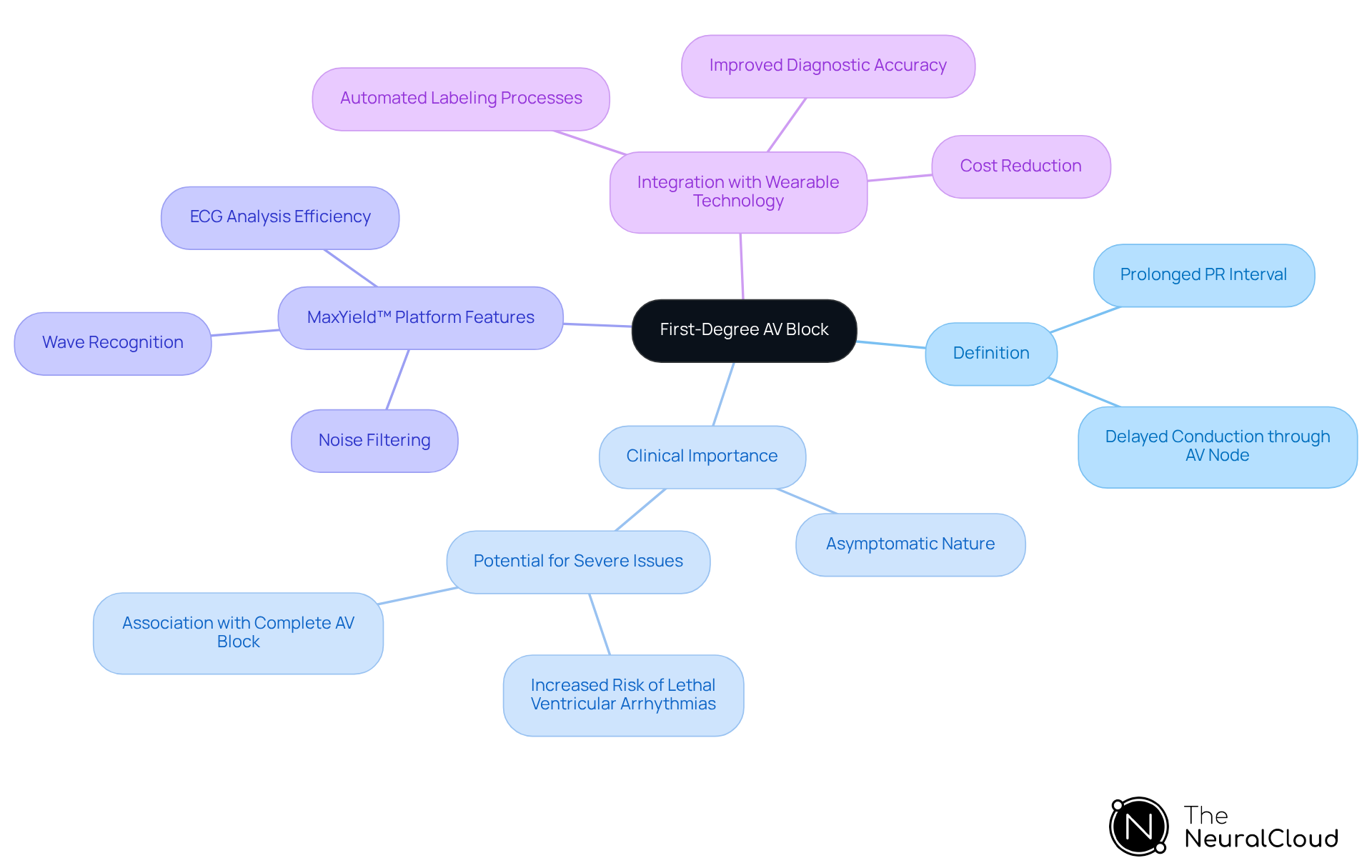
Diagnosing First-Degree AV Block: Key ECG Criteria and Techniques
Diagnosing primary AV obstruction presents challenges, particularly in identifying a on a . A key technique in this process is utilizing a to assess the relationship between , and the presence of 1st degree AV block ECG. addresses these challenges by offering advanced AI-driven that automates the detection of these critical intervals. This automation not only ensures accuracy but also enhances efficiency in ECG interpretation.
By integrating MaxYield™ into their diagnostic tools, healthcare professionals can significantly to measure and report these intervals swiftly. This integration facilitates , which is crucial for effective clinical decision-making. With MaxYield™, the potential for increases, as healthcare providers can act on accurate data more rapidly. The platform’s features empower users to navigate complex ECG data with confidence, ultimately delivered.
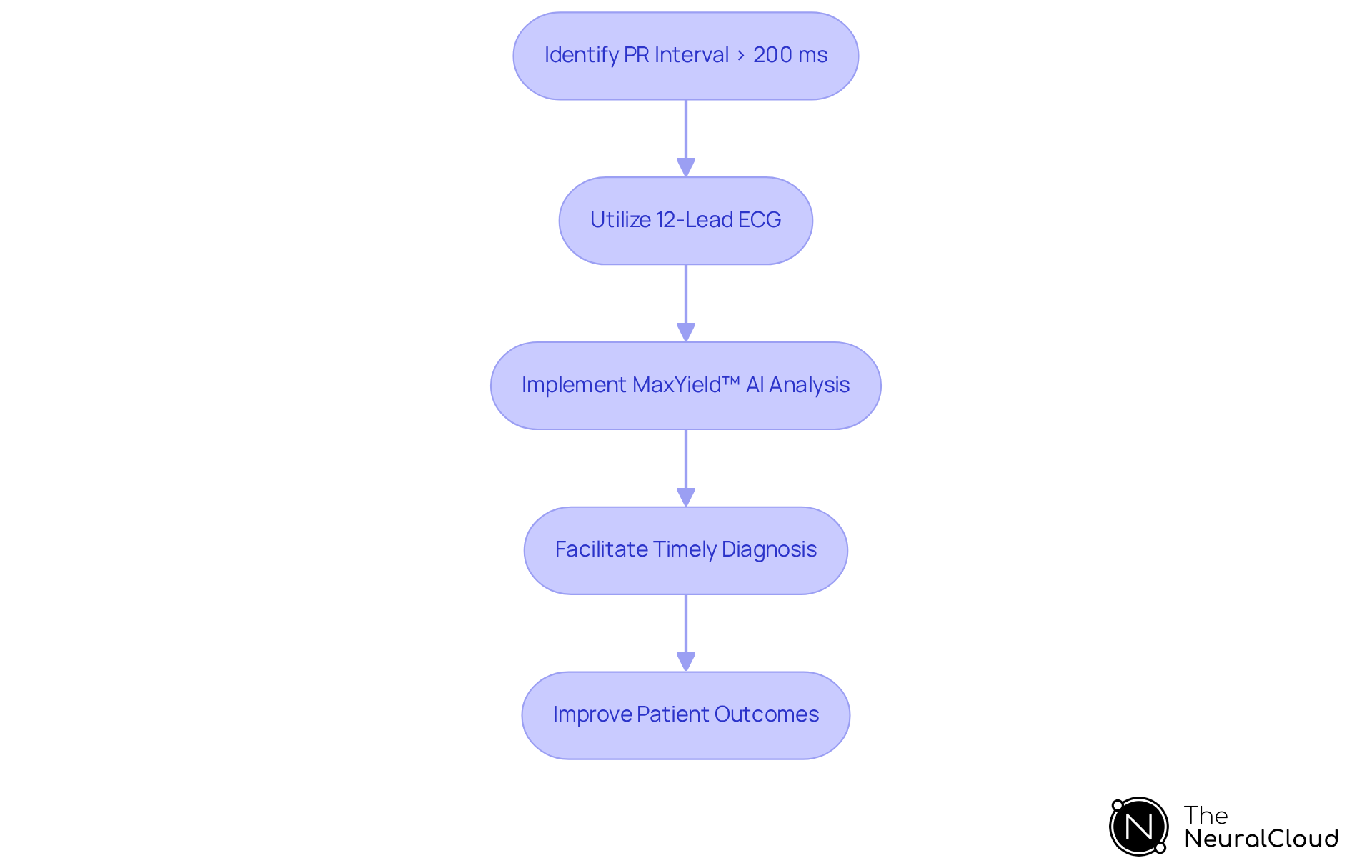
Recognizing Symptoms of First-Degree AV Block: What to Look For
is often asymptomatic; however, some such as fatigue, dizziness, or palpitations, particularly when the PR interval is significantly extended. Research indicates that the prevalence of among young adults ranges from 0.65% to 1.6%, with higher rates observed in well-trained athletes, reaching as much as 8.7%. Notably, individuals with primary AV obstruction face a two-fold adjusted and a three-fold risk of requiring pacemaker implantation. These statistics underscore the necessity of , as many individuals may not initially recognize their condition.
For instance, Jessika Seward, a college soccer athlete, discovered her during a routine physical, despite experiencing symptoms like shortness of breath and fatigue. This case illustrates the need for developers to consider into their applications, thereby enhancing monitoring and enabling .
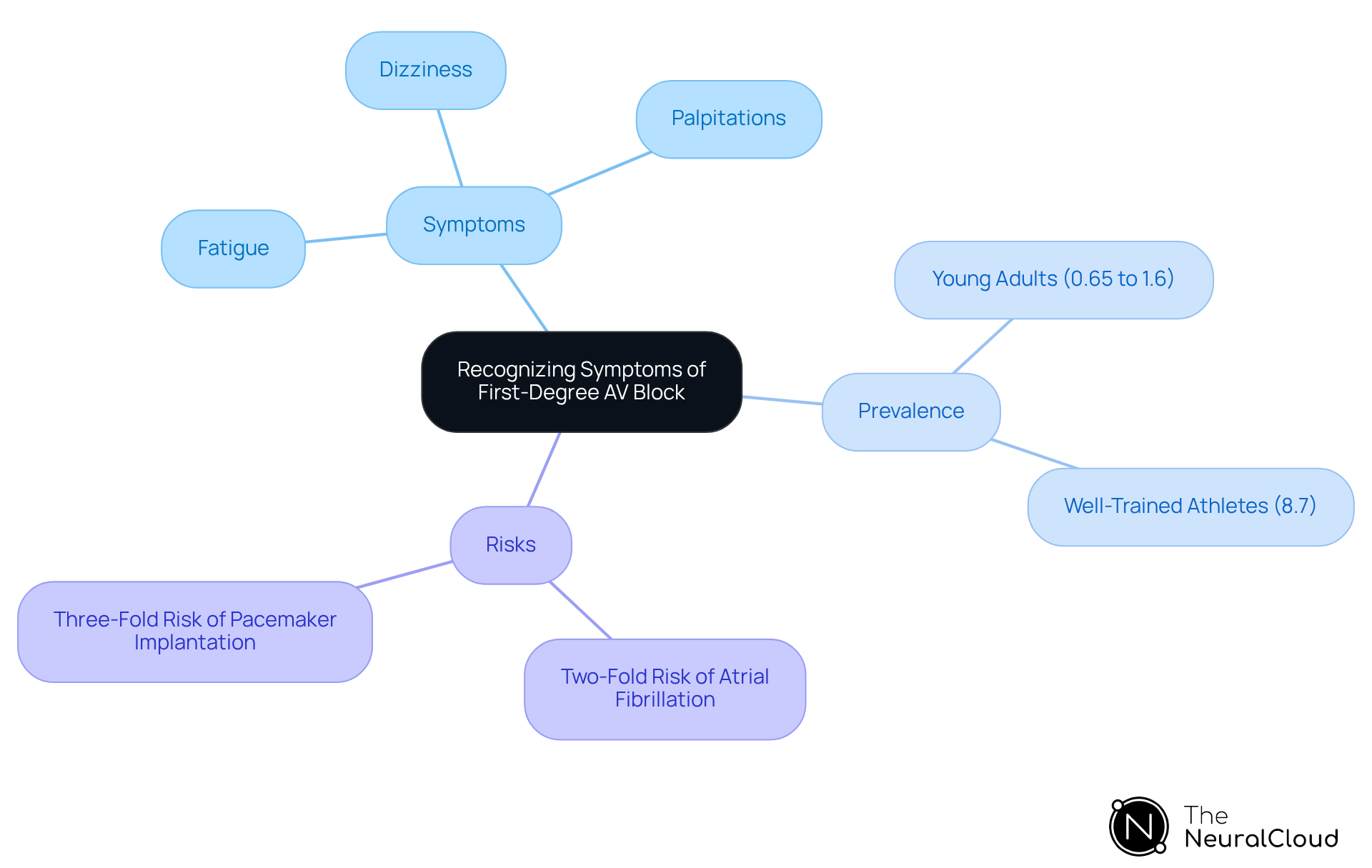
Treatment Options for First-Degree AV Block: A Comprehensive Overview
Most individuals with primary AV obstruction are asymptomatic and typically do not require intervention. However, when symptoms such as fatigue or palpitations occur, may involve adjusting medications that could exacerbate the condition. For example, discontinuing is advised when feasible. In rare instances, particularly when symptoms are severe or accompanied by other cardiac conditions, the implantation of a pacemaker may be considered. According to the Framingham heart study, individuals with primary AV disruption face a threefold greater risk of needing , underscoring the importance of diligent .
Developers should ensure their platforms provide relevant treatment guidelines based on , including the assessment of PR intervals. For symptomatic individuals, regular follow-up ECGs are essential to monitor for potential progression to . Real-world examples illustrate that individuals with , characterized by a PR interval exceeding 300 ms, may experience significant symptoms, warranting a more proactive management approach. , close monitoring and timely intervention are vital for optimizing patient outcomes in these scenarios.
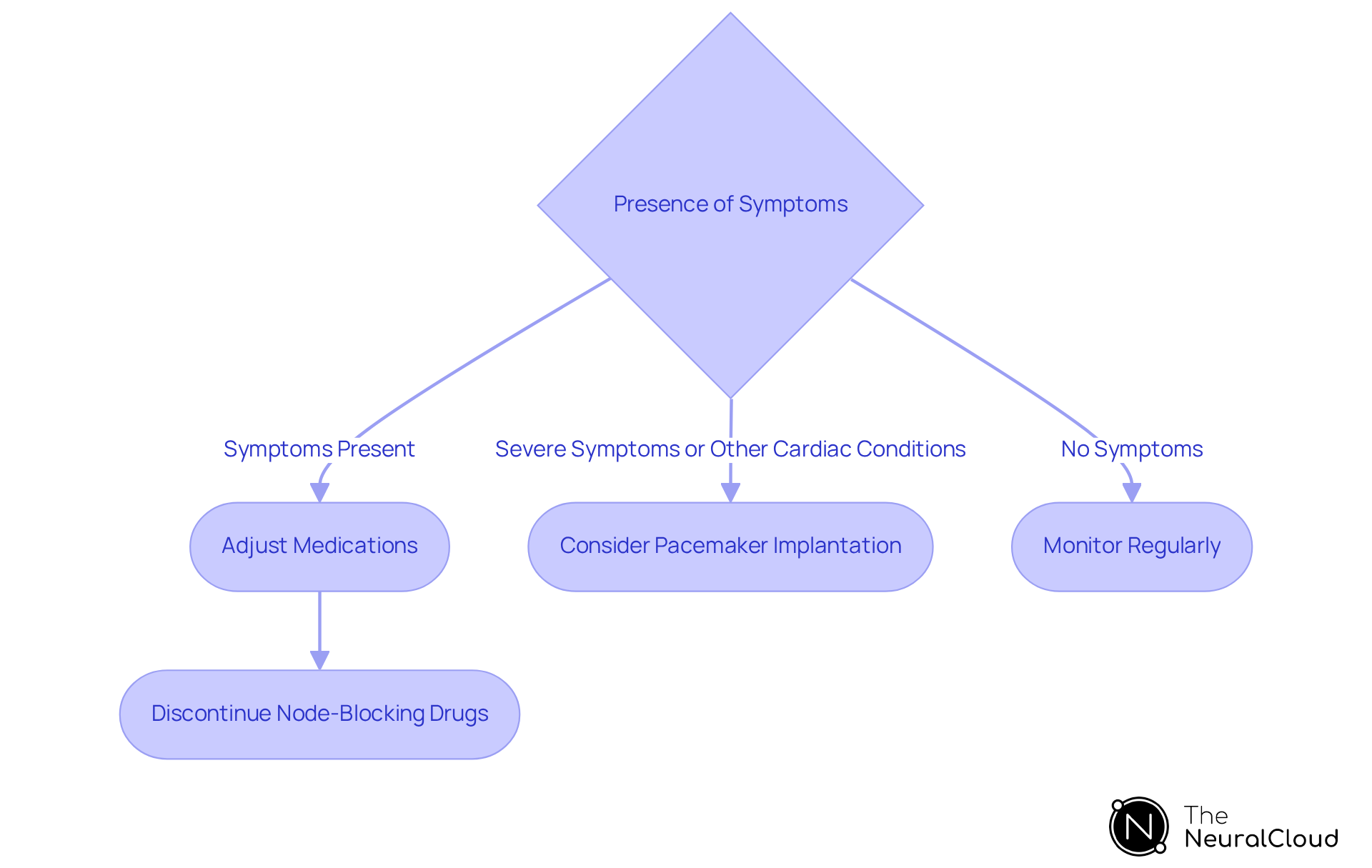
Complications and Risks of First-Degree AV Block: What Patients Should Know
ECG is generally considered harmless; however, it does carry the risk of progression to higher-degree impairments. Such progression can lead to , including syncope and heart failure. Research indicates that untreated can result in a two-fold increase in the risk of developing atrial fibrillation and a three-fold increase in the likelihood of requiring a pacemaker. Furthermore, individuals with primary AV obstruction and extended PR intervals face an elevated risk of adverse , such as heart failure and increased mortality rates, including the implications of [1st degree AV block ECG](https://theneuralcloud.com).
Approximately 6% of individuals over 60 years old experience primary heart conduction issues, highlighting the importance of regular of progression. To address this, developers should prioritize the within . These systems can inform patients and healthcare professionals about potential risks associated with AV conduction disturbances, thereby facilitating prompt intervention and effective management.
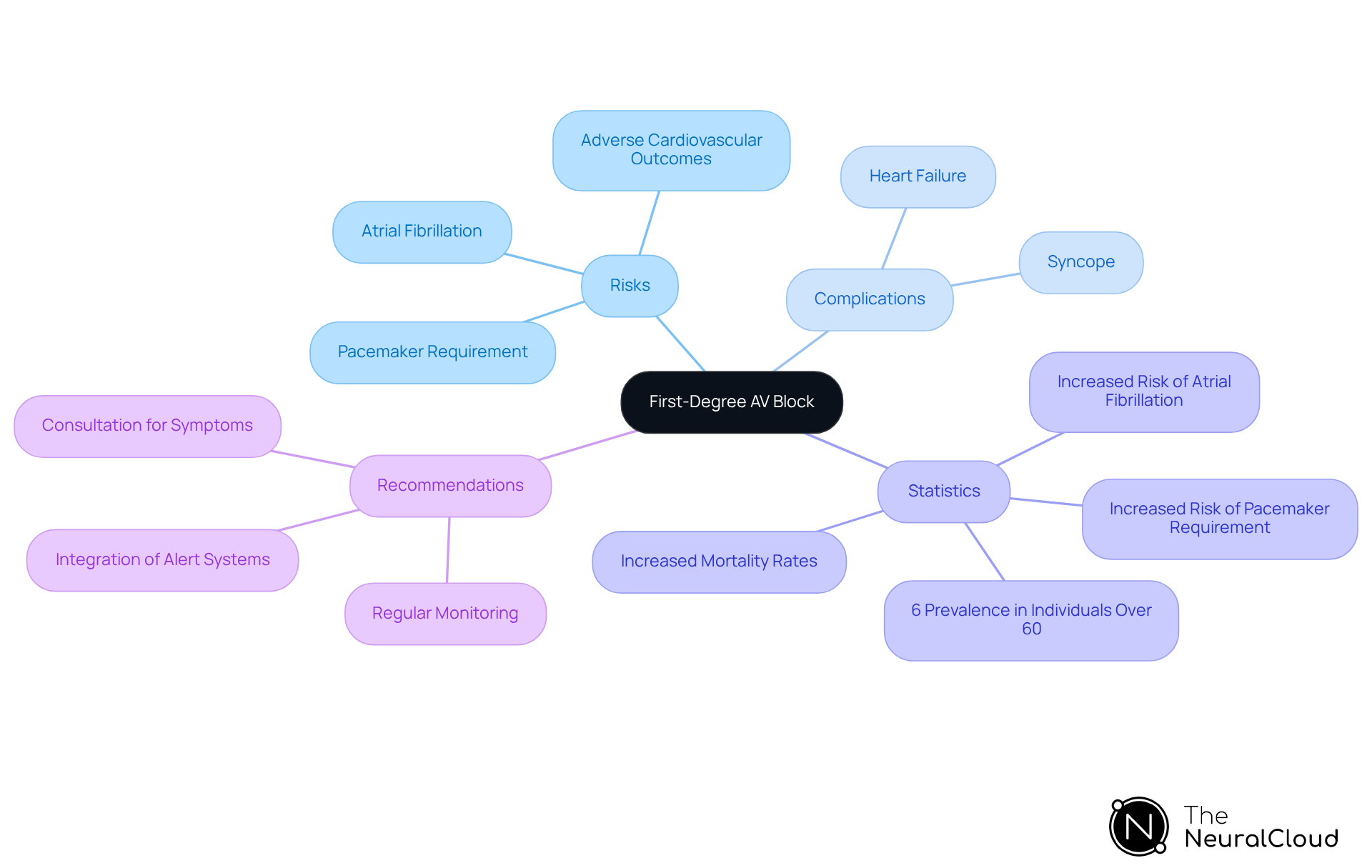
Lifestyle Modifications for Managing First-Degree AV Block: Practical Tips
Individuals facing primary AV obstruction can benefit significantly from . Adopting a , engaging in , and are key strategies. Furthermore, developers should integrate features that , such as:
- Tools for
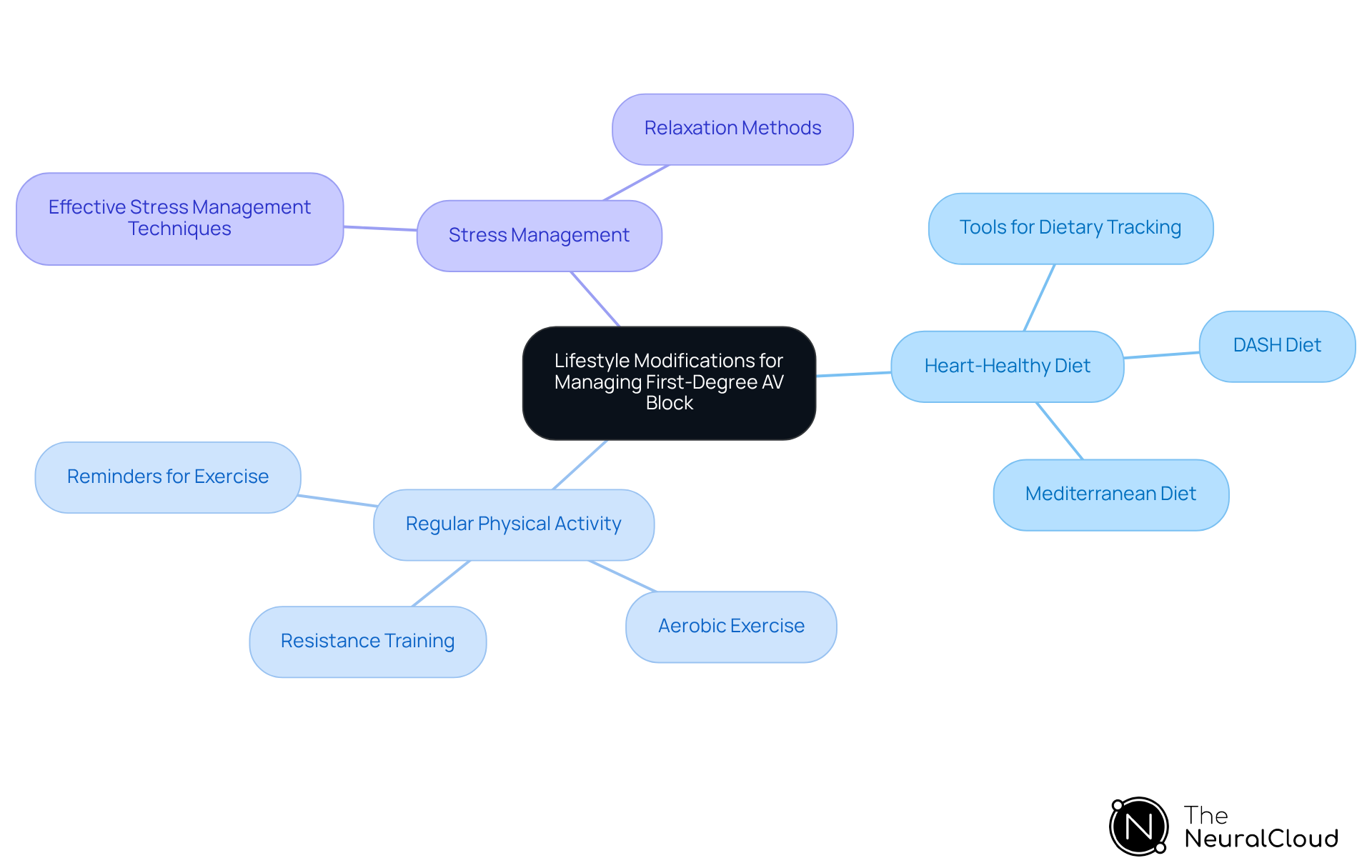
Epidemiology of First-Degree AV Block: Understanding Its Prevalence
First-degree AV obstruction is a prevalent condition, affecting approximately 1.0% to 1.5% of individuals under 60 years of age. This prevalence notably increases to about 6.0% among older populations, particularly adults aged 80 and above. Importantly, this condition is a significant predictor of mortality, with studies indicating that it is present in about 6.84‰ of the general population. Higher prevalence rates have been observed in specific demographics, such as African-American individuals compared to Caucasians.
The occurrence of is influenced by various factors, including age, gender, and underlying health issues. Men are roughly twice as likely to be affected as women, with a male-to-female ratio of about 2 to 1. Often asymptomatic, this condition is frequently discovered incidentally during routine ECG evaluations, including instances of . This underscores the necessity for regular monitoring, particularly in .
Case studies demonstrate that 1st degree av block ecg is associated with an and atrial fibrillation, particularly in individuals with pre-existing . A significant study involving over 15 million participants in China revealed that primary AV obstruction was the most commonly diagnosed type of AV obstruction, highlighting its relevance in clinical practice.
With the projected to triple the number of individuals aged 80 and older by 2050, must take these demographic trends into account when designing products. Solutions like Neural Cloud Solutions' MaxYield™, which incorporates for , can greatly enhance analysis efficiency. This platform addresses challenges such as and signal artifacts. By automating labor-intensive tasks, MaxYield™ not only reduces operational costs but also boosts productivity. This allows developers to concentrate on improving patient outcomes and the quality of care for older adults, particularly those with cardiovascular issues.

Current Research Trends in First-Degree AV Block: What’s New in Cardiology
Recent research has increasingly highlighted the long-term implications of , particularly its association with atrial fibrillation (AF) and heart failure. Research indicates that demonstrate a notably greater risk of developing AF, with hazard ratios reflecting a 2.06 increase in risk compared to those without the condition. Furthermore, the incidence rates of AF among individuals with a PR interval exceeding 200 milliseconds are significantly elevated, reaching 140 per 10,000 person-years.
In addition to these cardiovascular risks, ongoing studies are exploring the the onset of AVB. Understanding these genetic foundations could provide valuable insights into .
Moreover, complete AVB has been recognized as an independent risk factor for , underscoring the with this condition. should remain vigilant regarding these trends, as into their products can enhance diagnostic accuracy and improve outcomes for patients. Leveraging Neural Cloud Solutions' , which evolves with each use to maximize diagnostic yield, can further enhance the efficiency of . This model automates manual tasks and reduces workload by providing filtered ECG signals that aid healthcare professionals in making informed decisions.
Staying informed about the evolving landscape of cardiology research related to 1st degree AV block ECG will be crucial for developing innovative solutions that address the needs of healthcare professionals and patients alike.
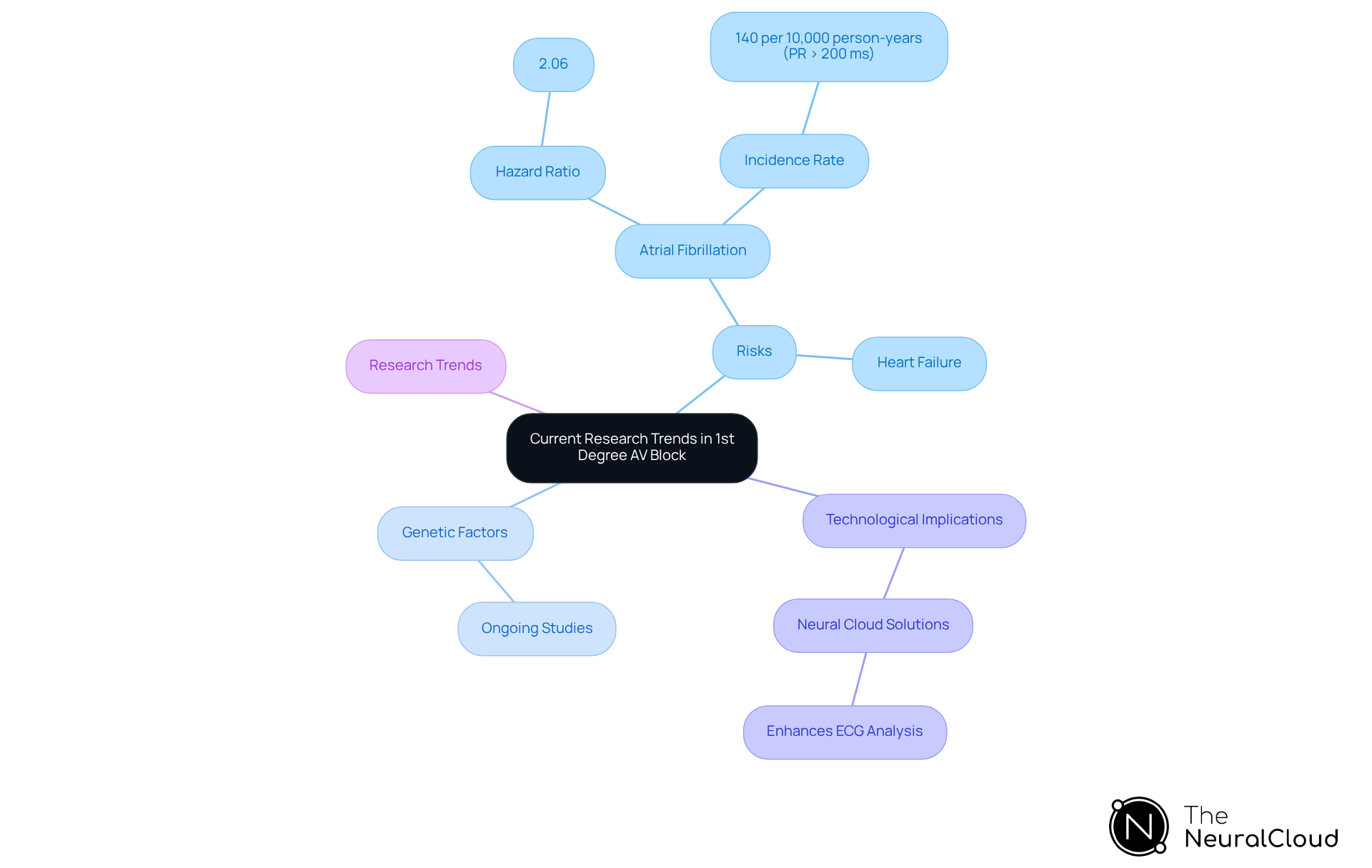
Key Takeaways on First-Degree AV Block: Essential Facts to Remember
The is characterized by a , typically exceeding 200 milliseconds, and is often asymptomatic. While generally considered harmless, the may indicate a potential progression to more serious heart conditions, necessitating ongoing observation. The integrates cutting-edge AI technology to transform lengthy and noisy ECG recordings into clean, crisp signals. This enhancement improves clarity and speed in ambulatory ECG waveform analysis. Studies indicate that a PR interval exceeding 350 milliseconds in patients with a 1st degree AV block ECG correlates with a higher likelihood of requiring permanent pacing, underscoring the importance of closely monitoring these patients with prolonged intervals to detect any changes that may necessitate intervention.
Lifestyle modifications are essential for managing conditions related to 1st degree AV block ECG. Patients are advised to adopt , such as:
- Maintaining a balanced diet
- Engaging in regular physical activity
- Avoiding tobacco and excessive alcohol consumption
These lifestyle changes can help mitigate risks associated with heart issues and improve overall cardiovascular health.
Real-world evidence emphasizes the necessity of monitoring. A retrospective study revealed that among individuals with a PR interval exceeding 270 milliseconds, nearly 43% demonstrated 1st degree AV block ECG and required permanent pacing due to symptomatic bradycardia or complete AV disruption. This finding highlights the critical need for for conditions like 1st degree AV block ECG, which can be significantly bolstered through the offered by MaxYield™.
Developers of should focus on creating solutions that facilitate precise diagnosis and of patients. By incorporating features that support regular monitoring and , such as those provided by MaxYield™, developers can empower healthcare professionals to make informed decisions, ultimately improving patient outcomes for those with 1st degree AV block ECG. Additionally, including user manuals and testimonials from healthcare professionals who have successfully implemented MaxYield™ can further enhance the credibility and practical application of this technology.
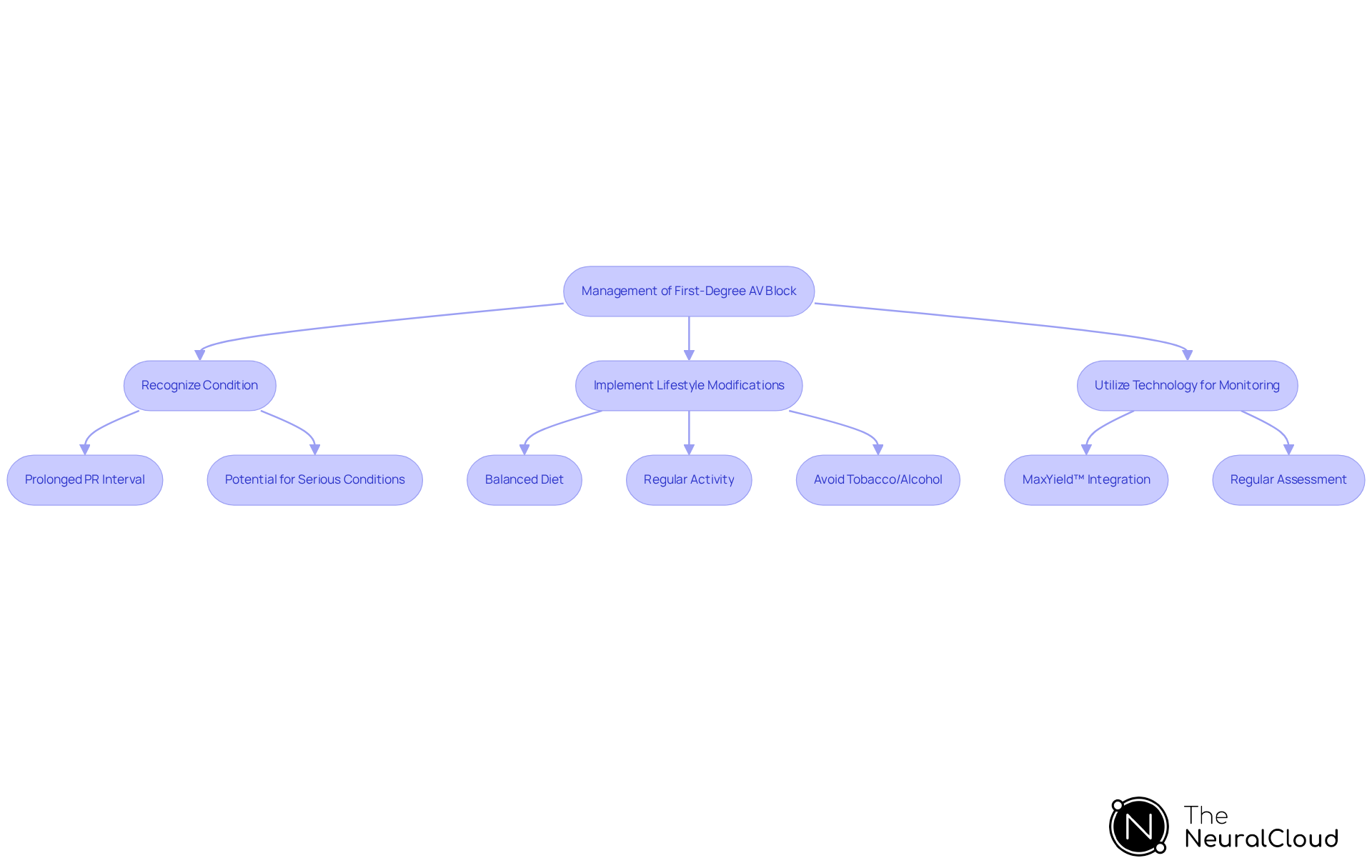
Conclusion
The insights presented on first-degree AV block ECG highlight its significance in cardiovascular health and the critical role of advanced technology in diagnosis and management. Utilizing innovative platforms like Neural Cloud Solutions' MaxYield™, healthcare professionals can enhance their diagnostic capabilities, leading to timely interventions and improved patient outcomes. This integration of technology streamlines ECG analysis and empowers clinicians with precise data for informed decision-making.
Key discussions within the article underscore the importance of:
- Recognizing symptoms
- Understanding treatment options
- Implementing lifestyle modifications for individuals with first-degree AV block
The evidence provided emphasizes the necessity for ongoing monitoring and assessment, particularly in populations at risk for progression to more severe conditions. By prioritizing these factors, health tech developers can create solutions that effectively address the complexities of managing first-degree AV block.
Ultimately, the convergence of advanced ECG analysis and proactive patient management is essential for mitigating the risks associated with first-degree AV block. As the prevalence of this condition continues to rise, particularly among older adults, the call to action for health tech developers is clear: focus on integrating innovative features that enhance monitoring, support lifestyle changes, and facilitate better clinical outcomes. Embracing these advancements will improve the quality of care and ensure that patients receive the attention they need to maintain their cardiovascular health.
Frequently Asked Questions
What is the MaxYield™ platform by Neural Cloud Solutions?
MaxYield™ is an advanced ECG analysis platform that utilizes AI algorithms and gold standard methodologies to automate ECG data processing, enhancing clarity and accuracy in diagnosing conditions like first-degree AV block.
How quickly can MaxYield™ analyze ECG data?
MaxYield™ can analyze over 200,000 heartbeats in under five minutes, providing healthcare professionals with actionable insights for clinical decision-making.
What is first-degree AV block, and why is it clinically important?
First-degree AV block is characterized by a prolonged PR interval on an ECG, indicating delayed conduction through the AV node. It is clinically significant because it can precede more severe heart conduction issues and may signal underlying cardiac problems.
How does MaxYield™ improve the reliability of ECG readings?
MaxYield™ improves reliability by isolating and labeling key features of the ECG, such as P-waves, QRS complexes, and T-wave intervals, allowing clinicians to detect subtle changes that may indicate primary AV impairment.
What are the benefits of automating ECG waveform labeling with MaxYield™?
Automating the labeling of ECG waveforms with MaxYield™ allows healthcare providers to focus on high-level decision-making rather than manual tasks, enhancing diagnostic yield and efficiency.
How does MaxYield™ address challenges in ECG analysis?
MaxYield™ features advanced noise filtering and distinct wave recognition, enabling efficient analysis of ECG data even in the presence of baseline wander, movement, and muscle artifacts.
What role does wearable technology play in conjunction with MaxYield™?
Integrating wearable technology with MaxYield™ allows for automated labeling processes, significantly reducing costs and improving diagnostic accuracy while addressing physiological variability and signal artifacts.
What diagnostic techniques does MaxYield™ facilitate for first-degree AV block?
MaxYield™ automates the detection of critical ECG intervals, such as a PR interval exceeding 200 milliseconds, using a 12-lead ECG to assess the relationship between P waves and QRS complexes.
How does MaxYield™ impact patient outcomes?
By providing accurate and timely ECG analysis, MaxYield™ enhances the capability of healthcare professionals to diagnose and manage cardiac conditions, ultimately leading to better patient outcomes.






